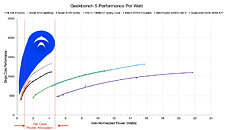Wednesday, August 12th 2020
NUVIA Phoenix SoC is 40-50 Percent Faster Than Zen 2 for a Third of Power
Last year, in November of 2019, a startup company called NUVIA Inc. broke out of the stealth mode and decided to reveal itself to the public. Focused on "re-imagining silicon", the company is led by some of the brightest minds in the semiconductor industry. Some people like Gerard Williams III, the CEO of the company, previously served as a chief CPU architect at Apple and has spent over 10 years at Arm before that. Others like Manu Gulati and John Bruno serve as senior vice presidents of silicon and system engineering respectively. Together, their people are forming a company full of well-known industry names. Of course, there are more and you should check out this page.
NUVIA Inc. promises to deliver only the best performance and "re-imagine silicon" as they say. Today, we got some bold claims from the company regarding the performance of their upcoming Phoenix SoC. Using Geekbench 5, the company has provided some simulated results of how the Phoenix SoC will perform. Being that it runs on Arm ISA, the SoC can run at very low power and achieve good performance. NUVIA has run some simulations and it expects its Phoenix SoC to be 40-50% faster in single-threaded performance than Zen 2/Sunny Cove at just a third of the power, 33% of the percent of power to be precise. In the graph below, NUVIA has placed its SoC only in 5 W range, however, the company said that they have left the upper curve to be disclosed at later date, meaning that the SoC will likely compete in high-performance markets and at higher power targets. While these claims are to be taken with a grain of salt, it is now a waiting game to see how NUVIA realizes its plans.
Source:
AnandTech
NUVIA Inc. promises to deliver only the best performance and "re-imagine silicon" as they say. Today, we got some bold claims from the company regarding the performance of their upcoming Phoenix SoC. Using Geekbench 5, the company has provided some simulated results of how the Phoenix SoC will perform. Being that it runs on Arm ISA, the SoC can run at very low power and achieve good performance. NUVIA has run some simulations and it expects its Phoenix SoC to be 40-50% faster in single-threaded performance than Zen 2/Sunny Cove at just a third of the power, 33% of the percent of power to be precise. In the graph below, NUVIA has placed its SoC only in 5 W range, however, the company said that they have left the upper curve to be disclosed at later date, meaning that the SoC will likely compete in high-performance markets and at higher power targets. While these claims are to be taken with a grain of salt, it is now a waiting game to see how NUVIA realizes its plans.


28 Comments on NUVIA Phoenix SoC is 40-50 Percent Faster Than Zen 2 for a Third of Power
This is another privately owned Startup looking for a handout in the form of investors.
Proof is in the pudding, put out an actual product to be physically tested or shut the hell up. Had enough speculative companies blow smoke.
AMD's dalliance with Big/Little Arm style cores did not yield good results
There is a reason for that.
They are suited to small power envelope - small performance devices. (compared to AMD/Intel etc)
The x86/x64 codebase is also too large for Arm to do anything about, as Apple (being a minor player in semiconductor) will soon learn.
I take these results with a grain of salt (especially because they're simulated). However, that doesn't change the names behind NUVIA.
nuviainc.com/leadership
Gerard Williams: Worked at Apple as Chief CPU Architect, ARM, Intel, and TI.
Manu Gulati: Google, Apple (Lead of SoC team), Broadcom and AMD
John Bruno: Google, Apple, AMD, ATI, Chief Engineer to "Trinity" APU.
The buzz over this group is less about the claims they're making here. But the names behind these claims. These are the engineers who delivered the Apple SoC, which is pretty good by any real measurement. They probably can deliver a new chip with amazing capabilities. And now they're beginning to market some bold claims.
----------
With that being said, the marketing blogpost is clearly shilling and was a waste of my time IMO. I'd be more interested if they were pushing out some details about why they think their chip is better (a larger decoder? A new methodology all together? A stepwise evolution that other companies haven't figured out yet? Etc. etc.). They're in the "generating hype" stage of their company, which is (unfortunately) necessary for funding these days.